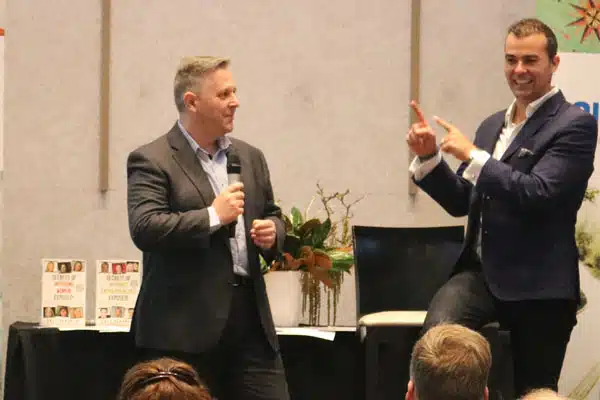Brendon Granger, CEO, Chief Experience Officer of Technology 4 Hotels is delighted once again to be presenting at the AIHE Conference. If you attended in person, I trust you enjoyed the presentation, as promised, he has generously made the presentation available. If you were unable to attend in person, that is a pity but you too can have access to the presentation.
To follow are his speaker notes too – as you can imagine, Brendon is a seasoned presenter so these speaker notes are not a direct transcipt but they represent the content.
Enjoy!
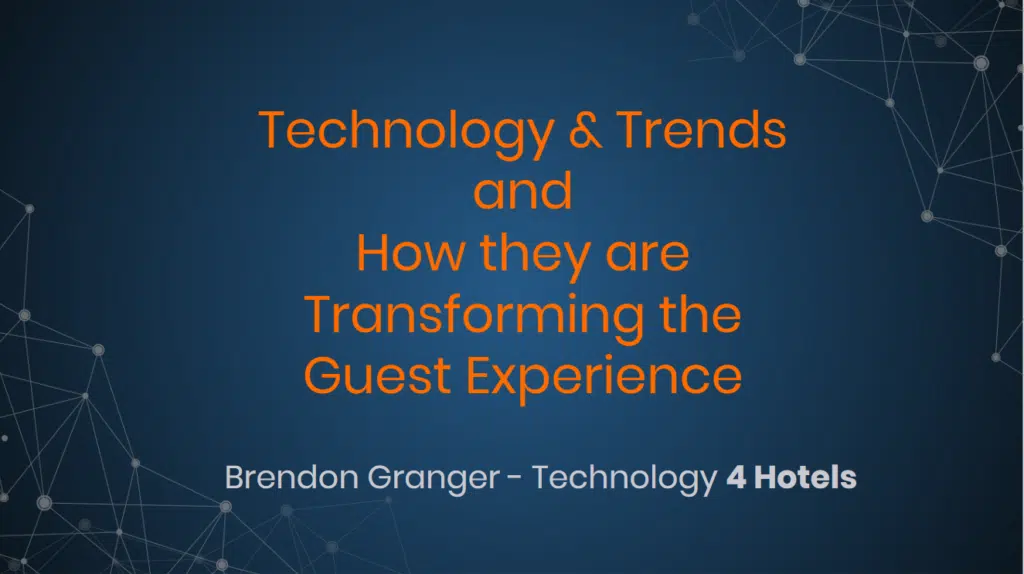
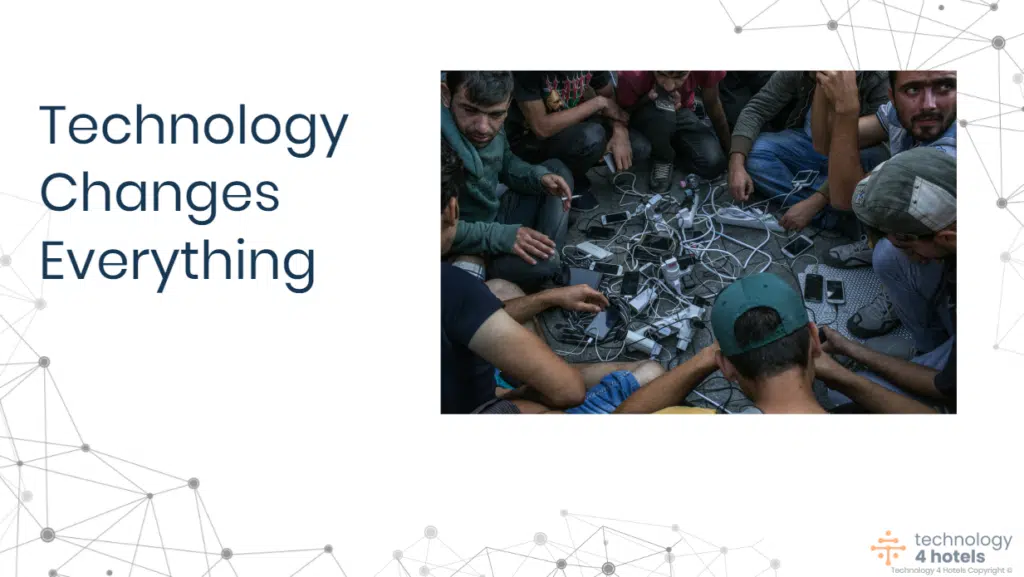
In 2016 when Syrian refugees flooded into Greece. Their first question wasn’t about food or water. They asked if there was WiFi and could they charge their phone.
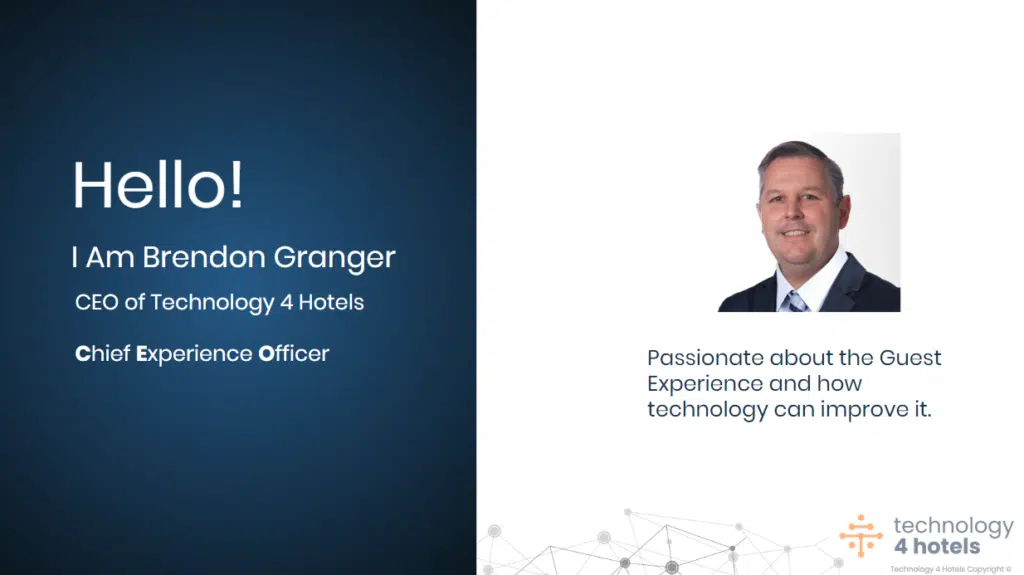
I am a hotelier and a geek. But most importantly. I am passionate about the guest experience and how technology can be used to improve it.
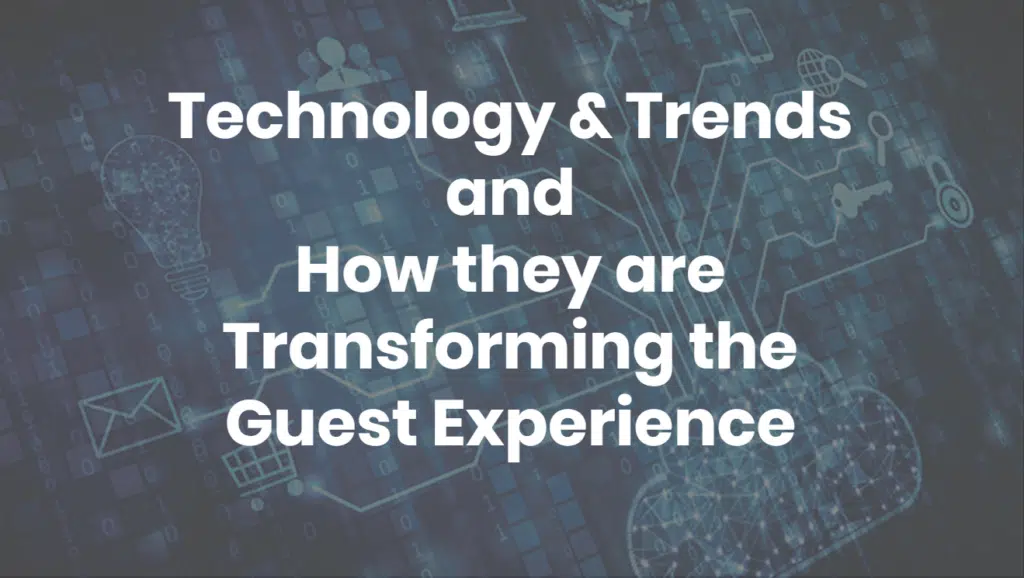
There are many trends in technology. I am going to focus on some keys trends that are currently affecting the hospitality industry and look at the impact – both positive and potentially negative on the the guest experience.
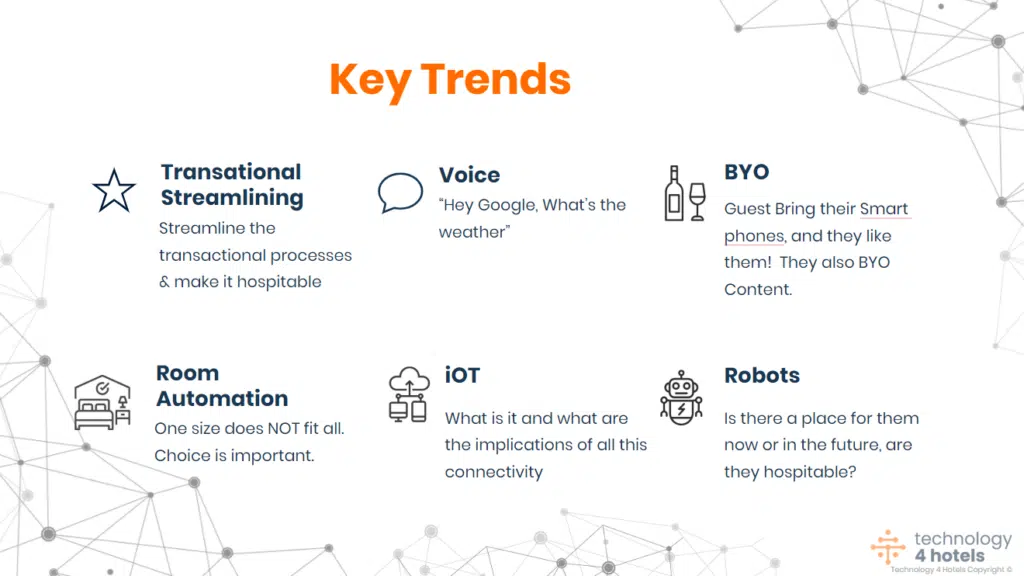
I will focus on 6 key trends. There are many. But I feel these are the ones to watch and in my view, keep on the radar.
No matter what, keep it personal. If we take the people out of hotels we could all be replaced by Robots.
Recognise that one size does not fit all. A clever tech solution with no familiar alternative can lead to operational issues and guest dissatisfaction.
Transactional Streamlining – making things easier for the guest
Smart Check-in – I see Smart check in, where technology handles the transaction and people connect with people as a great opportunity right now.
In-room Tablet or Guest Device ordering and communication – put the guest in control with the right tools and increase revenue at the same time
Voice Assistant such as Alexa – This is a technology to keep an eye on. I dont think our guests are quite ready just yet.
BYO – this is not a new trend. But in particular with the uptake of Netflix, I see offering guests the ability to cast as a “must do” for most hotels.
Room automation – I know most of you have implemented Energy Management solutions which is fantastic. I think there are opportunities to take things to the next level, But it must enhance the guest experience.
iOT – I think we are on the cusp of seeing some real benefits. Devices/Systems will be able to report that an issue is likely before it happens.
Robots – don’t worry, I don’t think our jobs are at risk! I do think, like many technologies, there is a place for Robots alongside people.
So as much as I love my tech and yes, personally I do invest in a few things “just because they are cool tech”. I don’t think hotels should do the same thing.
So before investing in tech, think about …………………… Why?
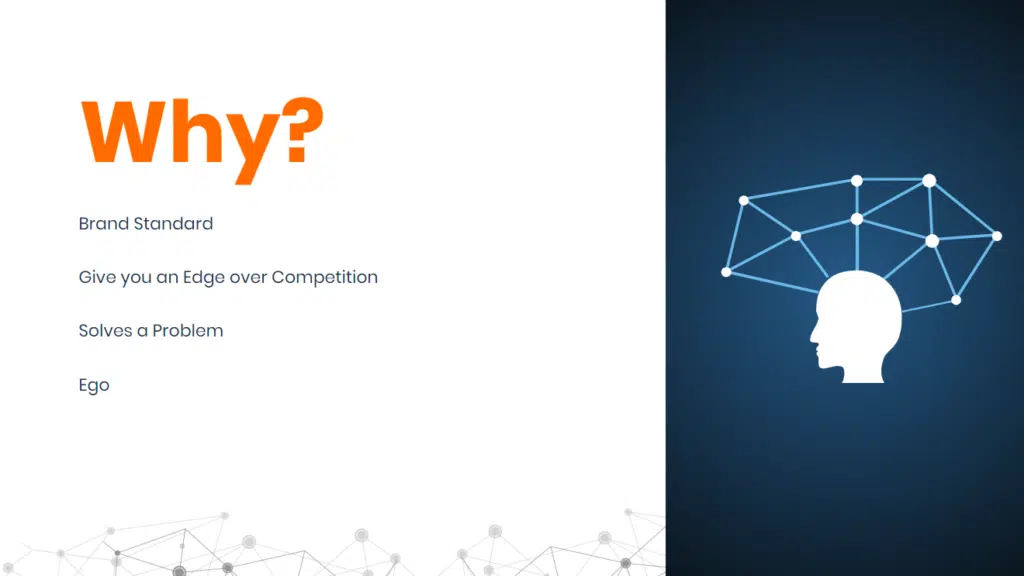
Think before you do
What drives the reason behind your implementation of new technology?
Brand Standard – assume it’s researched.
Competitive Edge – Done well, it can have a huge benefit, often with a finite life but it is a competitive market out there.
Solves a problem – Lion’s share of why technology should be deployed in hospitality. Make things better, faster, cheaper.
Ego – hopefully not
In all cases, Technology should have a positive or worst case neutral impact on the Guest experience.
I am going to step through the trends and their impact on the Guest Experience. I will start where the guest starts – Guest Check In
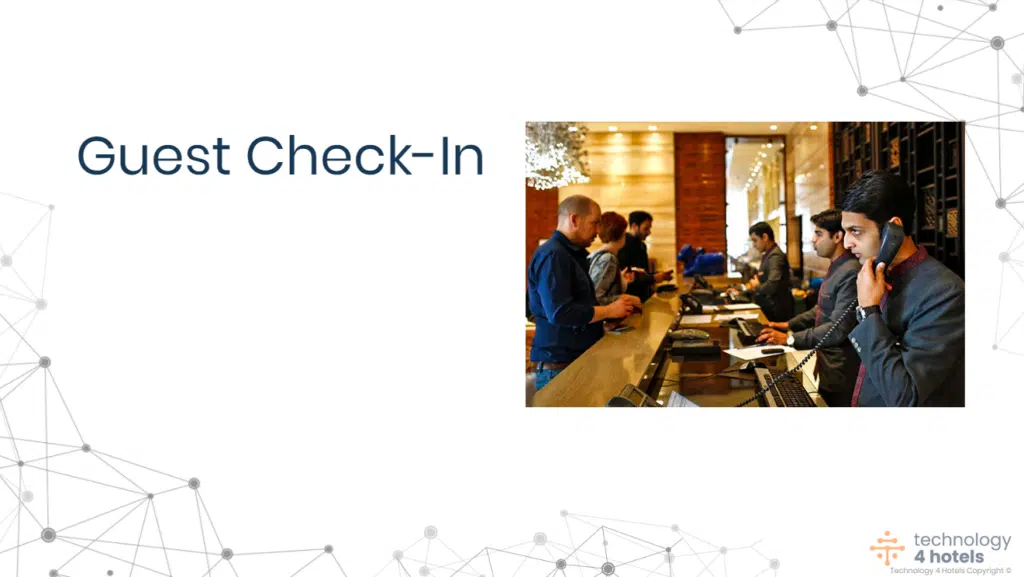
What Should Happen
Engaged staff welcoming your guests
What really happens, busy staff aware of queue and that guests are tired of waiting
Staff focus on the transaction ie checking booking, credit card authorisation etc
Guests wait in line pondering, “Why is this taking so long? They have everyone’s details. As like me, they already have a booking.”
What does the guest want?
To be warmly welcomed. To know about special features or offers that the property has for them and to get to their room so they can enjoy the facilities.
How can we be hospitable and use technology to improve the guest experience?
There is a move away from the traditional front desk. Mobile Key will come eventually. It works now in corporate hotels with repeat guests, who book directly and who’s full history and credit card details are in the system and they are loyal to the chain and the App.
In future I feel that you won’t even need to open the App and tap your phone on the door lock. It will be like your car, you door will open for you because you have your phone in your pocket.
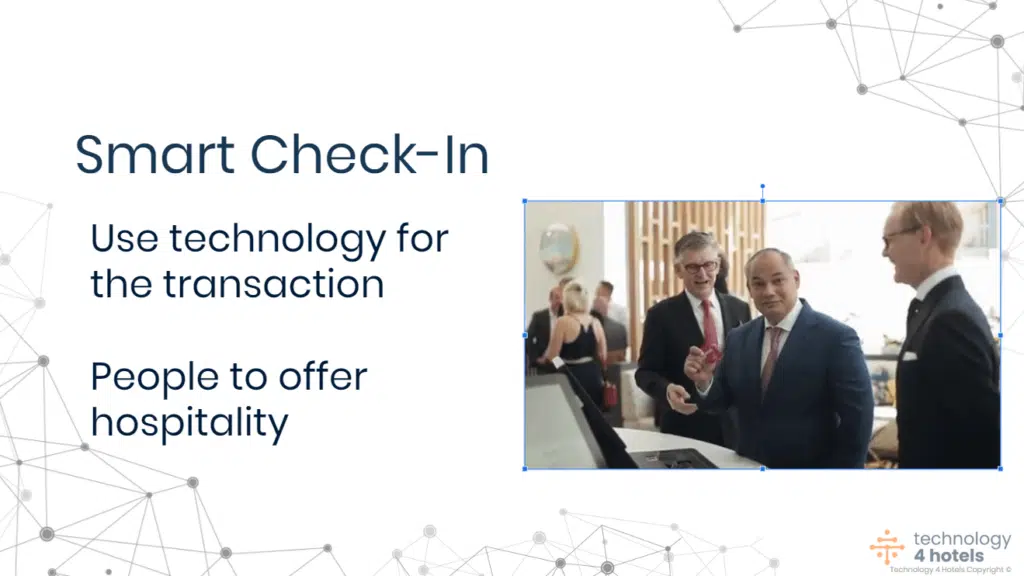
Smart Check-In. Beautifully presented and totally incorporated within the lobby “Smart Check In” technology.
Hotel staff are there to welcome guests. And assist with the transactional component of check in. If guests want to chat, they can, if they just want to check in or check out fast and get going, they can do that too.
5 Star experience and similar to bag check in at the airport – people love it as it is fast and easy.
CEO of Ruby says that their guests love it. He gets some many positive comments about the staff at Ruby Vs his other hotel that has a traditional from desk. He feels that the staff at Ruby truly engage with the guest because there is no barrier and they don’t have a computer to hide behind.
Back to Why?
Solves the guest problem of lengthy waits to check in and out.
Allows staff to offer true hospitality.
Property has the opportunity to save costs. Not only does it reduce front office staff, it can reduce back office workload as much of the processing is automated and fully integrated with other systems.
This is a perfect example of technology enhancing a process hand in hand with hotel staff. The guest experience is vastly improved as is operational efficiency. From reduced wait times to reduced staff and administrative processing.
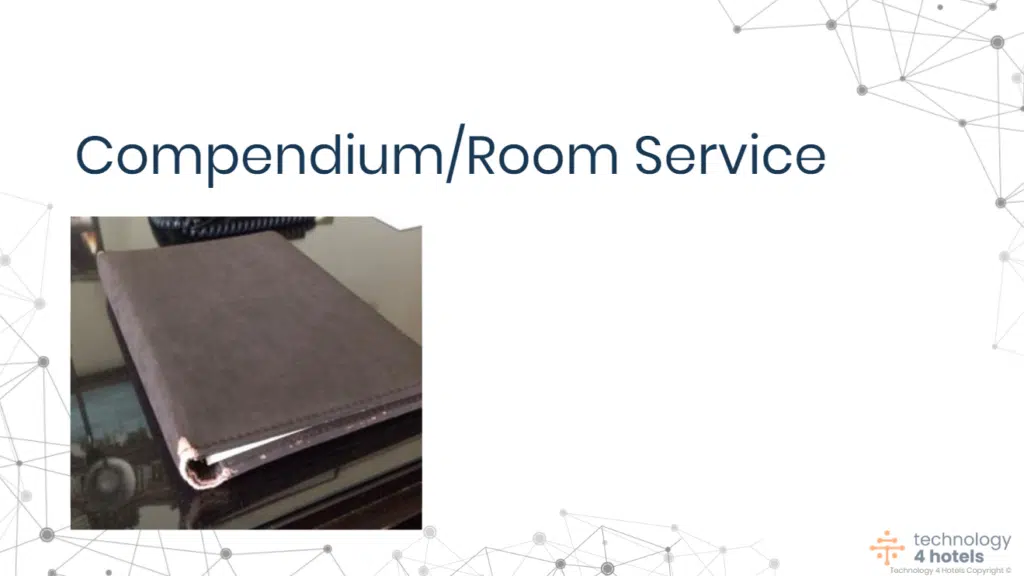
The Dog eared Compendium
Really? What does this say about your brand?
Expensive to maintain, don’t get looked at other than photographed for bad reviews on Tripadvisor!
Room Service Menu – words ONLY, not very enticing
Necessary evil that 5 Star properties feel obliged to provide.
Surely, this is ripe for the picking to use tech to do this so much better job.
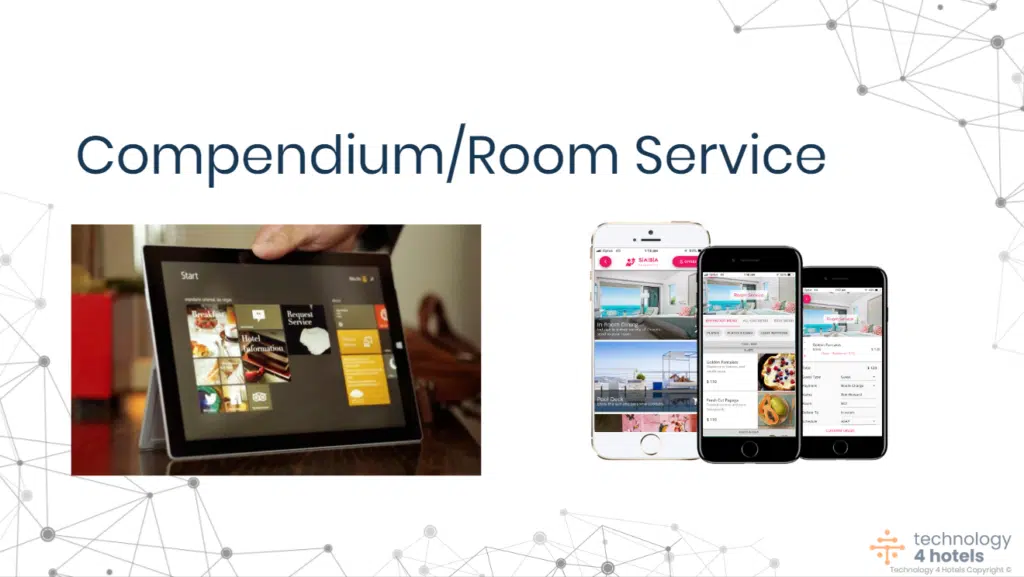
In Room Tablet – or Guest Smart Phone / Tablet?
Offer Room Service and allow the guest to make requests and get information easily.
It’s graphical with enticing images which makes it much more appealing. Cost effective to update and proven to increase the guest spend.
For the guest – Easy “stress free” Room service menu selection, upsell without pressure – real results are 30% increase in incremental spend.
“How do you want your steak cooked? “Would you like a beer or wine with your steak?”
Can also contain all of the other information about the property such as Gym and Pool Hours, Baby Sitting etc.
Again, this is all presented in a pleasing manner and easily maintained.
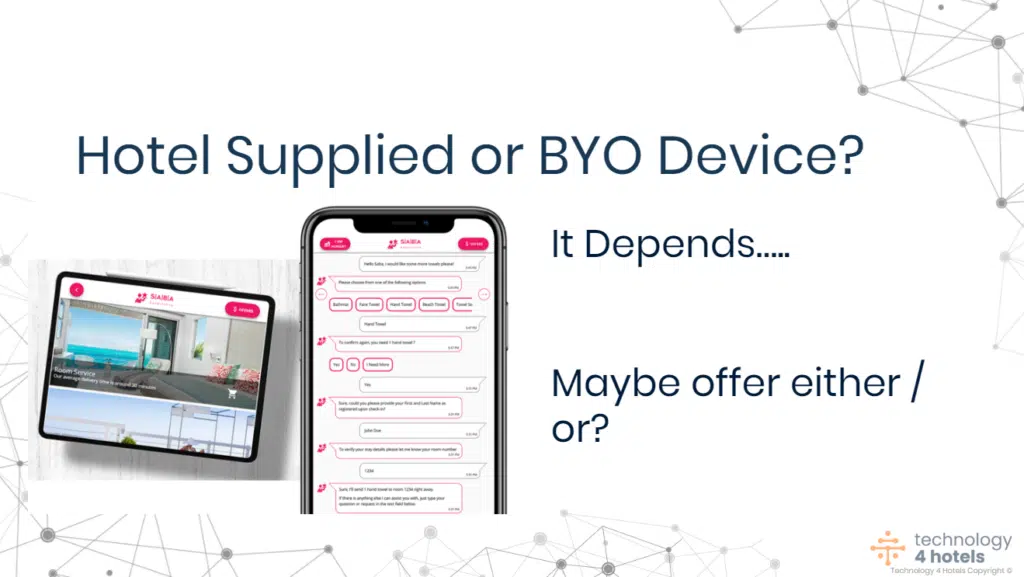
Do you provide an in Room tablet or let the guest’s use their device?
Which is right?
The answer is – It depends and often the real answer is to offer choice.
What does it depend on? Your guests. In particular their age as there’s a strong correlation with age and comfort with technology, The younger they are, the stronger the preference to use their own device. Also their brand loyalty – if you have a really good app guests will probably want to use that.
What’s good about utilising the guest device?
• guests know how to use it
• they are attached and connected to it.
• They will carry it with them throughout the property and even off property – Could book Room Service on the bus on the way back from Movie World
• As a rule, I feel hotel provided tablets are best left in guest rooms
What’s good about an in room tablet?
• Has a ”cool” factor and will entice guests to play with it
• Large screen – enticing images are presented at their best
• Guest doesn’t have to do anything, ie download an app, bookmark a url etc it’s ready for them in the room
Speaking of BYO……..
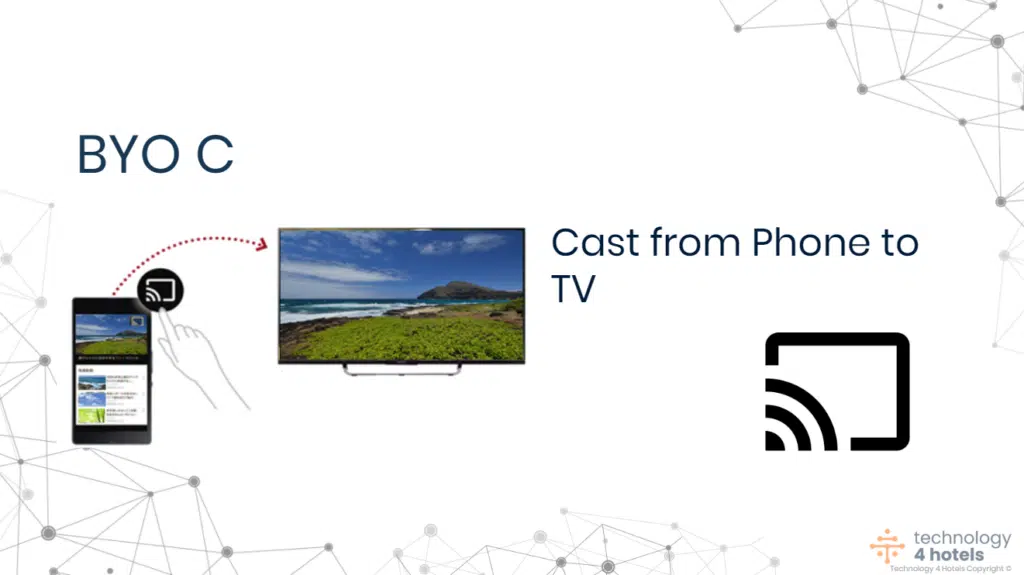
BYO C – BYO Content
Guests not only come with gadgets, they come with content. More content than we could hope to provide. Generally in the form of Netflix etc. They want to watch their shows. They have probably already seen the movies you may have on offer.
The guest Experience can be vastly improved by allowing them to easily watch their content on the in Room TV.
There are a number of options but by far, the best is casting, ie. Chromecast.
What is casting – it’s really “broadcasting” stuff from your phone or tablet or laptop to the in room TV. It needs to be a “castable” app. There are 1,000s the most popular is Netflix. But there is Stan, all the TV stations have a castable app and even Kayo.
True casting lets the guest cast a show to the TV and then use their phone as normal. Studies show most people “multitask” whilst watching TV.
Casting is universal and ubiquitous. The little cast icon seems to be pretty much on everything. It works on Apple and Android and many guests are already doing it at home.
The guest benefits from having ready access to their content and being able to enjoy it on the in room TV.
Take care and ensure security issues are well managed. You don’t want a guest casting the to TV next door. It must be easy for the guest to use. There are many solutions make sure you keep the guest top of mind when selecting what is best for them and your property.
Note – Mirroring is different, as the name suggests, the TV will mirror what’s on the phone – not a great solution
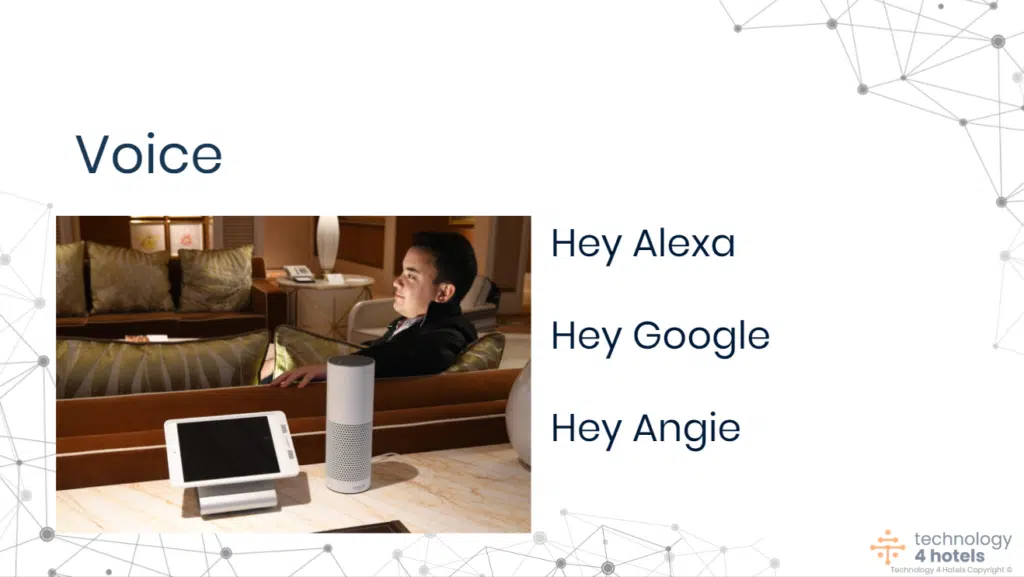
Voice is coming and it is a rapidly changing area.
Why would you implement it?
Cool factor but definitely not right for all guests and all hotels.
At a number of US hotels you can say “Hey Alexa, I need more towels.” I’m a geek, I love that but I also question if it enhances the guest stay.
It probably would not surprise you, I can voice control most of my lights and plenty of other electronics in my home.. My wife rolls her eyes “Oh great, something else to yell at” yet she will often say “Hey Google, put milk on the shopping list” and it will instantly be on our shared “Shopping list” which we each access on our phones.
My thoughts – watch this space, it is becoming more mainstream. But as a rule, guests are not ready for voice due to lack of familiarity. There are also concerns about security and privacy.
If you offer it, I think the guest must “opt in” rather than automatically have it and have to opt out.
I think a system that offers a screen and voice is far more likely to be accepted and enhance the guest stay rather than voice only.
If you are seriously considering voice, make sure you are improving the guest experience and there are still other ways for guests to access services, room controls etc.
I hear some hoteliers say that they are keen to implement tablets and or voice because they will then do away with the phone in the room…Kody, a tech savy friend had an interesting experience…………….
Word of caution – what problem is it solving?
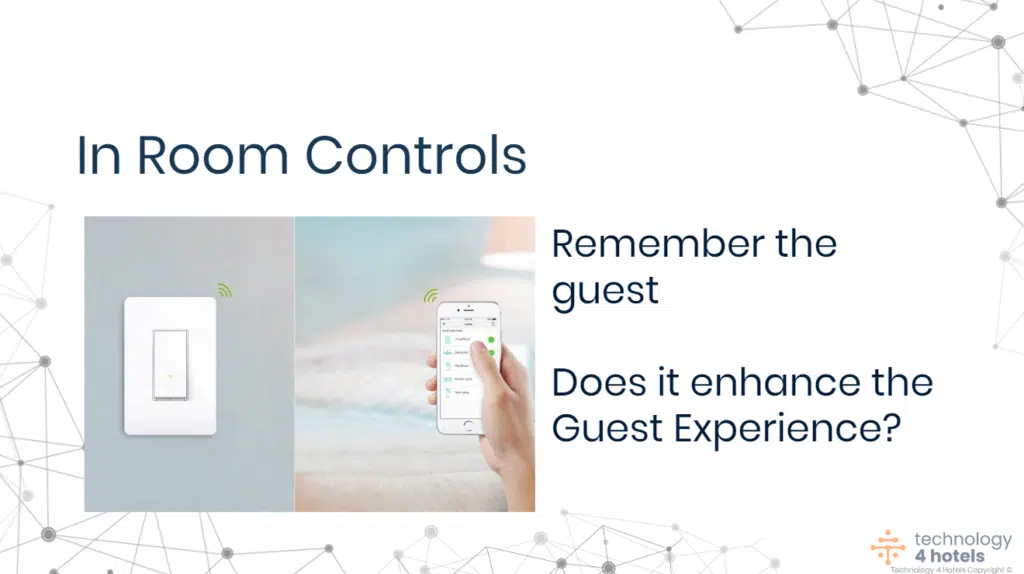
I am a huge fan of in room automation both from a guest and energy management perspective but……………………
It must be done well.
I believe the vast majority of you have implement Energy Management and you should be commended for that.
I think there are opportunities to enhance the guest experience. For example looking at TripAdvosr reviews of a recently opened Brisbane hotel.
Guests were wowed by the fact that the lights automatically went on and the curtains opened when they opened the door to the room.
We need to get the basics right before we fully automate. A huge guest frustration is hotel room lights. The biggest issue is they can’t find the right light switches or there is no master switch that turns all lights off from the bed. We need to get this right before we start automating everything else. As I mentioned before. What problem is it solving
A “subtle night night on” or sensor based strip lighting to guide them to the bathroom in the middle of the night
If you do automate, make it intuitive so it adds to the guest experience.
One hotel – blinds controlled via app on the TV. Turn on TV, Menu item 4 to open the blinds. (Lots of calls to reception and I am sure damage to the curtains)
Another – lighting controls was via the tablet. Innovative and VERY frustrated guest used the hand towel to remove hot light bulbs!
Don’t force the guest to use the technology. Have an option. In the above cases the issues could have been avoided by have a switch that the guest could use instead of the high tech option.
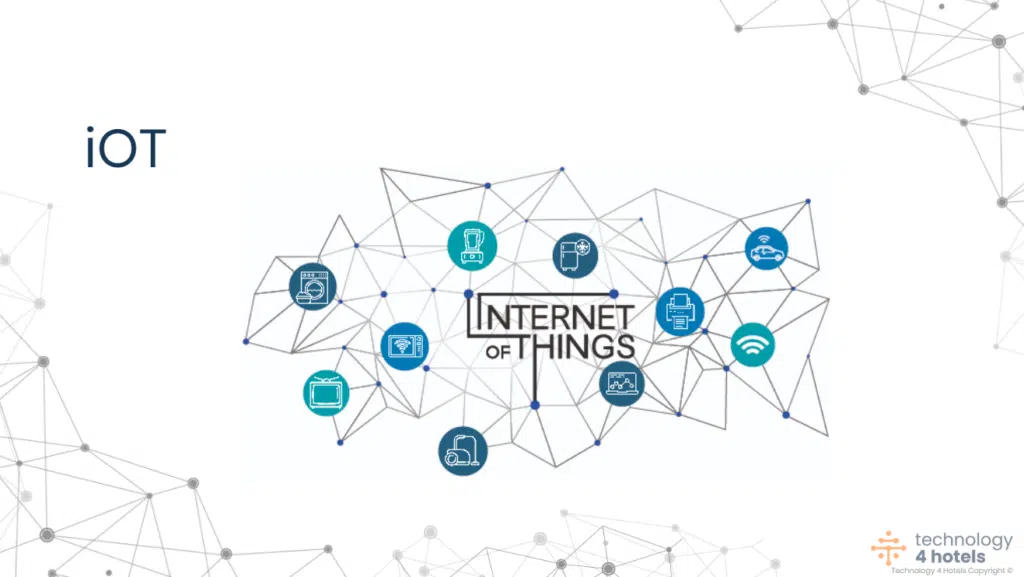
Put simply, the IoT describes all devices that are connected to the internet. As part of a digital network, all of these devices are able to collect and share data about their environment and how they’re being used. They can also be monitored and controlled.
So what does that mean to a Hotel and a Hotel Guest?
A guest could leave their room and the door sensor sends a signal to the lift so that it is on the floor so when the guest arrives at the lift. Kinda cool.
It’s quite a few years off but via IoT guest rooms could learn the guests behaviour and for example set the shower to the temperature that is knows the guest likes.
I think the greatest benefit from an Engineering standpoint is that devices will alert us as soon as they start malfunctioning or possibility even before they malfunction.
Using the lift example further. A lift connected to the cloud can send data such as door movements, trips and fault codes. Using data provided via the lift and AI, potential issues could be reported and prevented. If the lift does break down it can provide fault codes and proposed solutions so the technician can arrive with the right parts and tools.
Using a simpler example. TV remotes could send a signal when the battery was say at 10%, so the batteries could be replaced. Presently they are replaced on a scheduled basis whether they need to be or not or the guest is the one that discovers the remote doesnt work. Small saving, but when combined they can become quite significant. You can see how this could apply to many things such as light globes ……
So the iOT can improve the guest experience directly by learning their preferences to offer a truly personalised stay and also by ensuring all items in the room are working
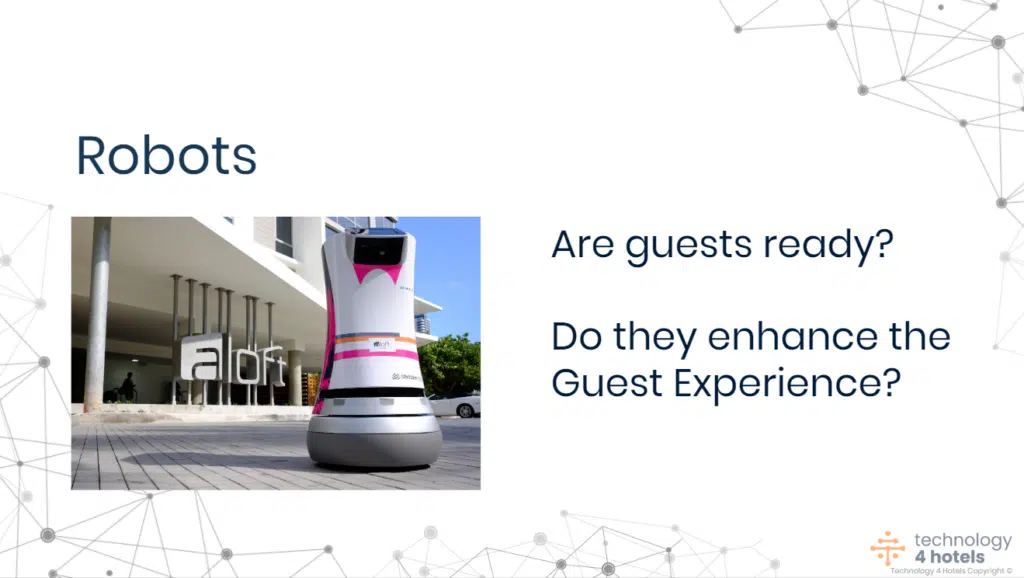
I can’t talk about technology, without talking about robots!
First though, what is a robot? It’s a machine capable of carrying out a complex series of actions automatically.
So clearly the Aloft’s delivery robots pictured here, Relay by Savioke is a robot. You may have also read about the robots in the Hena hotel in Japan.
Hena Hotel robots have been making headlines. Many not all were fired but I think some context is appropriate. The Hena was designed to see “how far you could go” with using robots in a hotel. It was experimental and designed to push boundaries. It opened in mid 2015. The hotel was not aiming to service everyone, it was designed to offer a unique experience, along the lines of the Lego hotel.
Only earlier this year, many of the end of life robots were “retired” and humans not robots have replaced them. The robots were fired due to poor guest feedback, unreliability etc. This does not mean robots don’t have in place. It just means that some of the boundaries have been found. In particular, using robots alone to assist guests with complex interactions such as check-in and interestingly, in room AI robots were unable to offer reliable guest feedback about theme parks, flight schedules etc.
So, it all comes back to the guest and will the technology add to their experience.
The Relay delivery robots are a fabulous way to offer a unique experience and if you want to deliver a lot of toothbrushes, get yourself one. Does that enhance the guest experience, I’d have to say “Yes”, does it help to promote the hotel, “Yes again”, just look at how many guest reviews talk about Relay and how many YouTube video there are, it’s definitely sharable.
Today, Relay is an example of technology deployed to provide a competitive edge via the Wow factor. But this may change.
Today in hotels, robots that can undertake or assist with “back of house” tasks are able to offer true value and indirectly enhance the guest experience.
Rosie from Maidbot can vacuum whilst housekeeping make the beds and clean the bathroom. She can also sense air quality and “report back”. Delivery robots can deliver luggage to rooms.
As with many technologies, it’s not the technology alone that we should be looking at but rather the technology working alongside people. Making things quicker and easier and generally better than when done by a human alone.
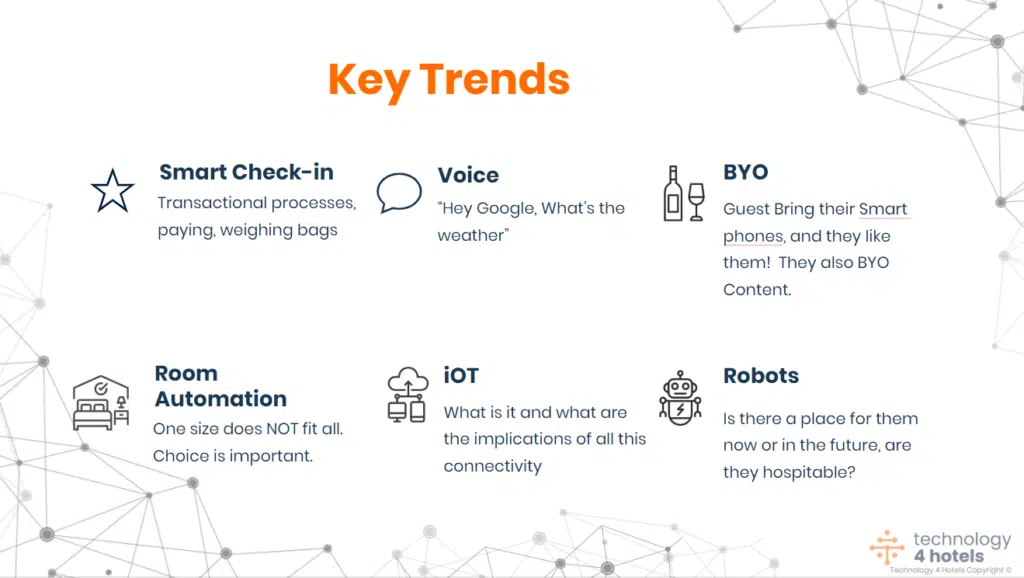
So to recap on the trends
Transactional Streamlining – making things easier for the guest
Smart self check in – Where technology handles the transaction and people connect with people is a great opportunity right now.
In-room Tablet or Guest Device ordering and communication – put the guest in control with the right tools and increase revenue at the same time
Voice – watch this space, it is becoming more mainstream
BYO – Providing guests with the ability to cast their own content is something most hotels should be looking at.
Room automation – Get the basic’s right and build from there. Make sure it adds value. There is a wow factor in turning on the lights and opening the blinds when the guest first enters the room.
iOT – I think we will start to see more and more connected devices reporting back on their status over the next few years. This will deliver real benefits, with fewer outages and quicker rectification times.
Robots – We will start to see Robots working alongside staff to do repetitive, dangerous and dirty jobs.
In closing. Technology should be used to enhance the guest experience. By making things better, cheaper, faster,
Dont forget – People are unique, situations are different and emotions often come into play. Providing choice is the answer. So maybe your guest can order room service via the tablet but they have just arrived and are starving and know they just want a burger, give them the option to pick-up the phone as well.
Dont force the guest to use technology. Give them a choice. A tech solution coupled with a familiar alternative provides the best of both worlds for all guest types and demographics.
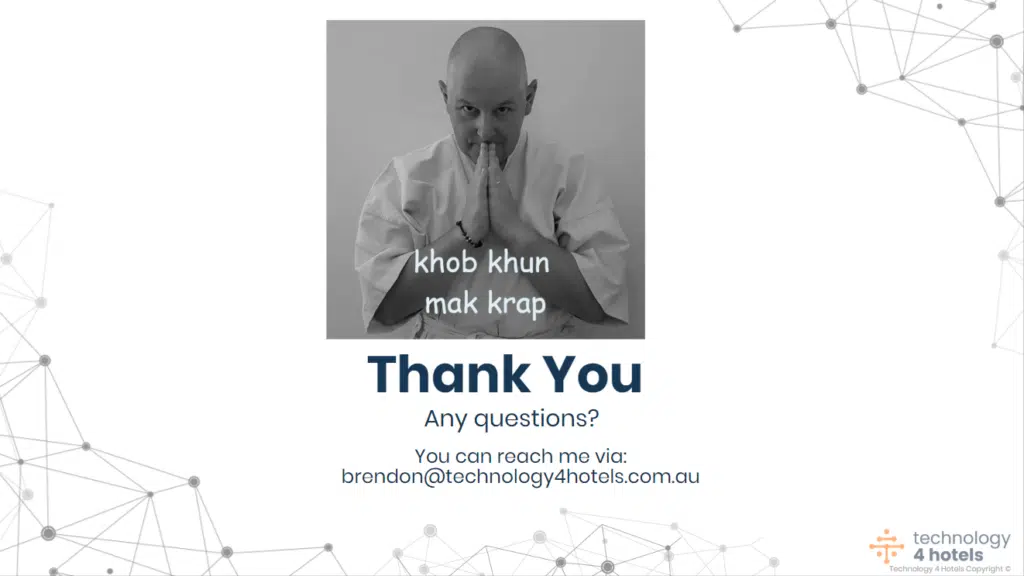
Thankyou

